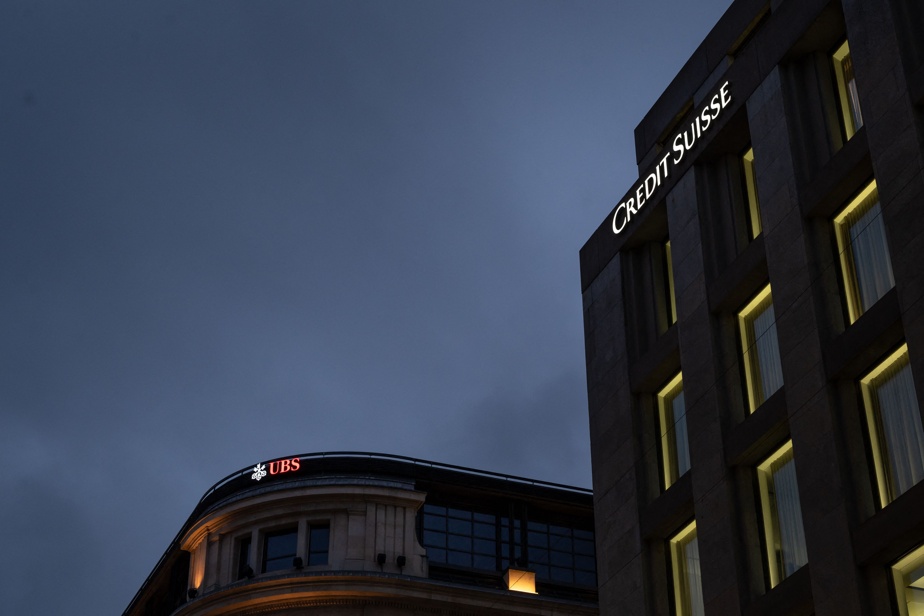(Bern) Switzerland’s largest bank UBS, pushed by the authorities, agreed on Sunday to buy its rival Credit Suisse for 2 billion dollars, according to the Financial Times, agreeing to double down in extremis to prevent a debacle and a panic in the markets on Monday.
The presidents of the two banking giants, Colm Kelleher for UBS and Axel Lehmann for Credit Suisse, take part in a press conference by the President of the Confederation Alain Berset, from 2:30 p.m. (Eastern time).
Marlene Amstad, president of the financial markets policeman and Thomas Jordan, the boss of the central bank are also present.
According to the British financial daily, UBS agreed to double the amount initially proposed to overcome the reluctance of Credit Suisse and one of its main shareholders.
The transaction would be made only in UBS shares and would value the Credit Suisse share at a price of 50 cents, instead of the 25 initially proposed, which remains much lower than the share price on Friday at the close (1.86 francs).
The transaction was examined in Bern by the federal government, already meeting urgently on Thursday and Saturday.
The merger between these giants, who are both part of the very exclusive club of 30 too big to fail banks, should therefore be completed and announced in time for the opening of the Asian markets.
The hope being that this may be enough to prevent widespread panic.
The banking sector has been under stress since the major central banks have raised their rates sharply in an attempt to control inflation. Many institutions have failed to prepare after years of having access to cheap money.
The recent bankruptcy of Silicon Valley Bank in the United States and other regional American banks has increased investor anxiety and prompted them to sell the securities of banks considered to be the weak links.
This is the case of Credit Suisse, which for 2 years has gone from resounding scandals to reverses.
And despite the efforts of its management to tout a three-year restructuring plan, nothing worked. Investors voted with their feet and the Zurich establishment struggled to access liquidity at reasonable prices.
A lifeline of 50 billion Swiss francs launched Wednesday by the Swiss central bank, after a black day on the stock market, gave only a brief respite to the bank.
The regulatory authorities and the federal government have had to deal with immense pressure from Switzerland’s main economic partners to clean up the situation before it contaminates the whole world.
According to the Financial Times and tabloid Blick, the bank’s customers withdrew 10 billion Swiss francs in a single day late last week.
According to the Bloomberg agency, UBS is demanding that the public authorities bear legal costs and potential losses that can amount to billions of francs.
On Saturday, the discussions stumbled on the investment banking activity, according to the financial agency, one of the scenarios being studied being a resumption only of asset and wealth management with a sale of this branch.
By contrast, UBS, which spent several years recovering from the shock of the 2008 financial crisis and a massive state bailout, is beginning to reap the rewards of its efforts and it took tremendous effort from the authorities to that the management of the bank agrees to put on the habit of the saviour.
The Competition Commission could also raise eyebrows depending on the configuration of the takeover.
The discussions also focus on the fate of the Swiss branch of Credit Suisse, one of the profitable parts of the group which lost 7.3 billion Swiss francs last year and still expects “substantial” losses in 2023.
This branch brings together retail banking and loans to SMEs. One of the avenues considered by analysts is that of an IPO, which could limit layoffs in Switzerland due to duplication with UBS’s activities.
On Sunday, the bank employees’ union in Switzerland “demanded” the participation of social partners in the discussions, given the “enormous” stakes for employment.
“And when the stock market opens on Monday, Credit Suisse could be a thing of the past,” Blick predicted.
